12 Easy Camping And Backpacking Meal Brands, Ranked
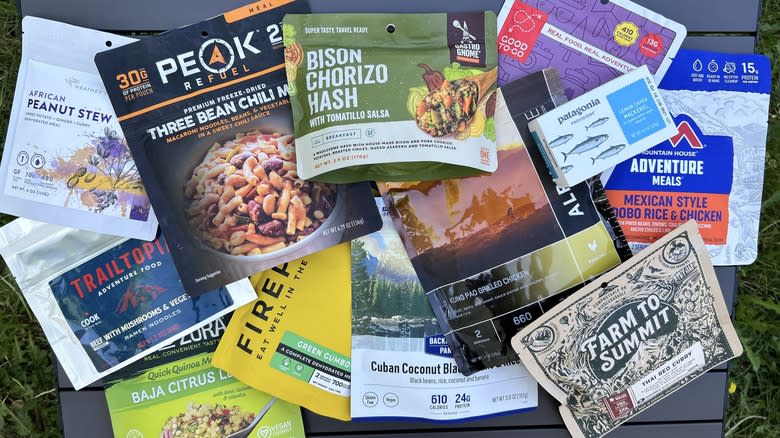
For some, backpacking and camping are type two fun, but dipping your spork into a hot meal should be pure enjoyment. However, that's not always the case — and trust me, there's nothing worse than painstakingly carrying rations for miles only to scoop up flavorless, liquidy mush. Pro tip: Although dehydrated meals require just water, follow the instructions closely — which I will admit, I have not always done while pitching a tent in the dark.
In doing this review, I discovered that all of these brands create tasty camping recipes. Piping-hot boiling water and patience are key. But as you'll read in the methodology section below, taste was just one of many factors. I also considered brands' selection, quality of ingredients, nutrient density, and value, as well as its efforts to sustain and protect the environment we all deeply care about. With extensive research and these criteria in mind, I've rounded up 12 easy camping and backpacking meal brands, ranked worst to best.
Some recommendations are based on first-hand impressions of promotional materials and products provided by the manufacturer/distributor/etc.
Read more: 20 Popular Canned Soups, Ranked Worst To Best
12. Peak Refuel
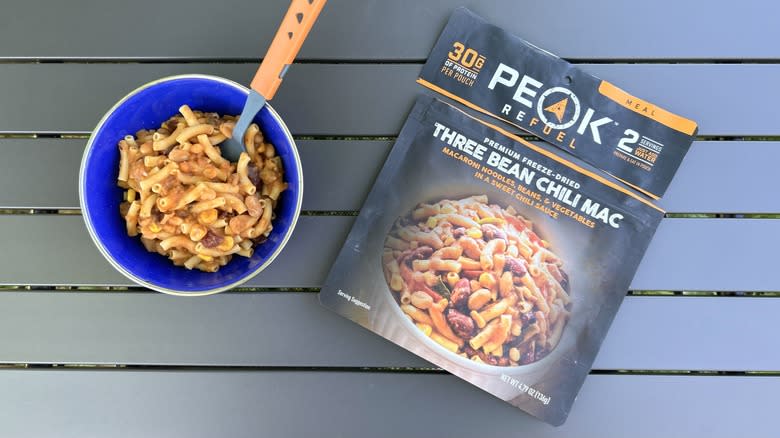
Peak Refuel was founded in 2018 and operates out of American Fork, Utah. It offers five dehydrated breakfast meals, 13 filling entrées like its venison country casserole and chicken alfredo pasta, and two dessert cobblers. They're available as single pouches and bundles, and mains are priced between $7 and $8 per serving, which is average among competitors.
The brand takes pride in using "100% real meat," free of textured vegetable protein — which, to me, is a weird flex. Widespread evidence demonstrates that TVP is not only nutritionally sound, as affirmed by certified sports nutritionist Dr. Grant Tinsley, but also better for the environment in comparison to animal products, as published in the National Library of Medicine. However, there's something to be said about using whole foods, and I appreciate that Peak Refuel offers three vegan meals, plus two additional options that are dairy-free. It also creates several gluten-free meals — but note that they are not certified as such.
Peak Refuel claims that, on average, each meal contains 37.6 grams of protein. But based on my math, the average among breakfast and main meal pouches is actually 36.8 grams. It's also important to note that each pouch contains two servings, or roughly 18.4 grams of protein per on average. According to Peak Refuel, its "meals have nearly double the amount of protein per serving than most outdoor meals on the market." But as you'll discover in this review, it appears that isn't true.
11. Trailtopia

With a simplistic website and sticker labels, it could be easy to assume Trailtopia is a small, lesser-known brand. But its products are carried in more than 600 retailers across the country, including REI. The Rochester, Minnesota-based company admirably supports environmental campaigns like Save the Boundary Waters and was established by longtime outdoor enthusiast Vince Robichaud in 2013.
Family-owned and operated, Trailtopia creates a variety of lightweight camping and backpacking meals. These include an egg scramble and a variety of oatmeals for breakfast, regular and gluten-free ramen noodles for lunch, and more than a dozen comforting dinner entrées. Savor favorites like its beer-braised chicken stew, Cajun smack chicken & rice, and chili mac with beef, followed by dessert: cheesecake with a crisp graham cracker topping.
Several mains are available as single pouches priced between $6.49 and $8.50, as well as double-serving pouches that cost between $10.99 and $14.99. While this pricing falls in the mid-tier, it's arguably less of a value given that, on average, Trailtopia entrées contain just 9.6 grams of protein per serving — which is significantly less than other reviewed brands. However, I appreciate that vegan and gluten-free options are available, as are convenient bundles pre-built for three- and five-day adventures.
10. Patagonia Provisions
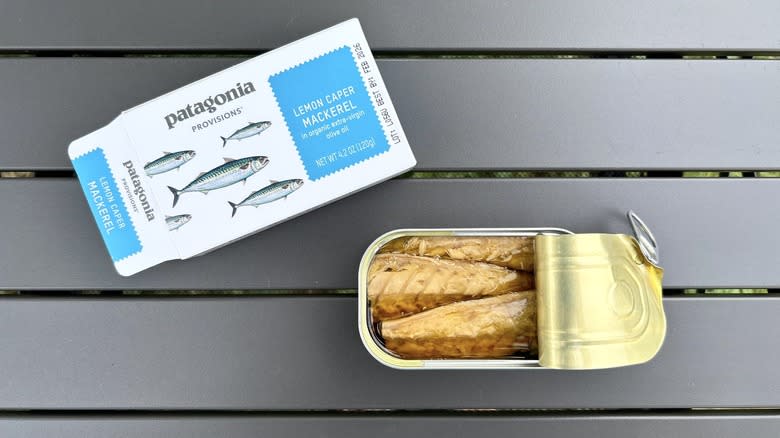
Upscale canned seafood brands have long been served alongside Spanish tapas — but other restaurants have picked up on the trend, as has outdoor gear and apparel company Patagonia Provisions. The sustainably minded business entered the food space in an effort to bring Regenerative Organic Certified and responsible fishing practices into the spotlight. It's advised by environmental professionals with Wild Fish Conservancy and Good Fish Foundation, and it's both a Certified B Corporation and 1% for the Planet partner. Simply put, the brand is above par when it comes to eco-consciousness — even its paperboard and can packaging is recyclable.
Its $8 seafood tins include flavorful anchovies, mackerel, and mussels, each packed in olive oil and available as both singles and variety packs. The selection also includes two $14 salmon options: a 6-ounce lightly smoked wild sockeye salmon and black pepper wild pink salmon with two 4-ounce filets per package. Pair these with its organic grains, including pasta and crackers, or simply toss one in your backpack and hit the trail.
On average, Patagonia Provisions' seafood contains 18.8 grams of protein per serving, which is above average compared to other backpacking meal brands. However, its products are a bit pricier — and arguably, does canned fish alone count as a meal? As much as I love Patagonia, it ranks lower on this list due to a limited variety, which doesn't meet the needs of common dietary restrictions. Also, packing out an oily container isn't quite as convenient as other options.
9. AlpineAire Foods

AlpineAire Foods was established in 1979 and joined the Katadyn Group of brands in 2012. For such a large corporation, I was surprised that a social impact statement wasn't available on its website — especially when similar corporate competitors like Mountain House partner with eco-consciousness organizations. But like other well-established backpacking meal brands, AlpineAire Foods boasts a wide variety of dehydrated meals. According to its parent company's website, these include breakfasts, mains, and desserts. However, you can't make online purchases via Katadyn Group, and major retailer REI only carries the latter two categories. Still, there's plenty to choose from with locations stocking more than 20 of the brand's products in-store.
Enjoy Kung Pao grilled chicken, wild mushroom fettuccine alfredo, spicy sausage Bolognese, and more two-serving pouches. The cost of main entrées is more affordable than most competitors, with pricing between $8.95 and $14.95. On average, lunch and dinner meals contain 15.1 grams of protein per serving, and both gluten-free and vegetarian options are available — but none are entirely plant-based.
8. Wild Zora
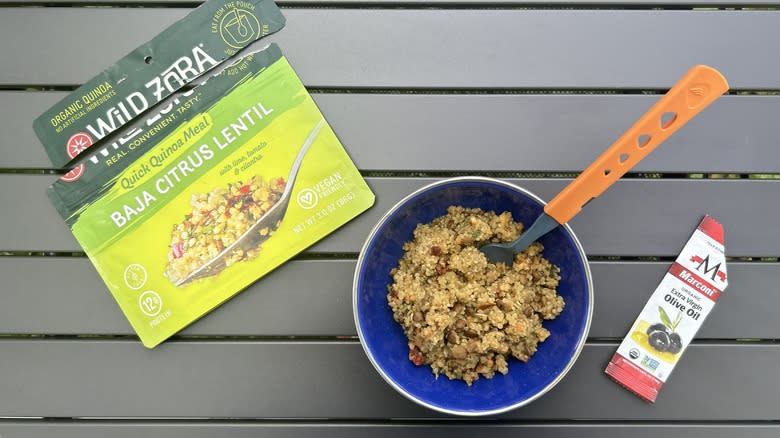
Zora Tabin, co-founder of Wild Zora, grew up eating fresh, whole foods in the Czech Republic. Upon emigrating to Colorado, she reportedly struggled to find ready-made meals that met the health standards she set for her family. All natural, high protein, low carb, and free of gluten and added sugar — it's a tall order when it comes to American pre-packaged foods.
Inspired to fill the gap, Tabin developed the brand's first products, meat and veggie bars, in 2014. Freeze-dried backpacking meals shortly followed, and now, the selection spans more than two dozen options. These include breakfasts, like its instant grain-free hot cereals, as well as globally inspired entrées, quick quinoa-based meals, and a variety of soups, all of which are sold as singles and bulk packs. Many meals contain organic ingredients, grass-fed beef, and free-range chicken. Those looking to avoid major allergens will also be pleased by the variety, as will those following paleo and plant-based diets.
Its more substantial to-go meals have an average of 18.9 grams of protein per one-serving package, and they're priced between $7.99 and $13.99 each — which is more costly than other tested brands. But for some, it's worth paying up for higher-quality ingredients. Really, my only issue with Wild Zora comes down to taste. While its healthy meals are flavorful and right in line with others' preferences, they don't quite deliver the rich comfort I crave after a long day of hiking.
7. Mountain House

Since it was established in 1963, parent company Oregon Freeze Dry has served many needs: military rations during the Vietnam War, astronaut food on the Apollo 13 Moon-landing mission, and Mountain House meals for the backcountry adventurer. As far as freeze-dried pouches, its standard selection includes more than two dozen hearty options, like its popular breakfast skillet or beef stroganoff with noodles, as well as ice cream sandwiches for dessert. Compared to other brands, Mountain House is less accommodating to dietary restrictions, but several meals are gluten-free and four vegetarian options are available.
Its main entrées each contain two servings with an average of 14.1 grams of protein per. They're priced between $10.25 and $11.50 — which is notably more affordable than most brands. Mountain House also offers single-serving Military Rations pouches, each priced at $11.99. These feature larger portion sizes with up to 43 grams of protein, and like its standard series, they come in recyclable packaging. Buy them as singles or in bulk kits, which are also sold in-store at REI.
6. Heather's Choice
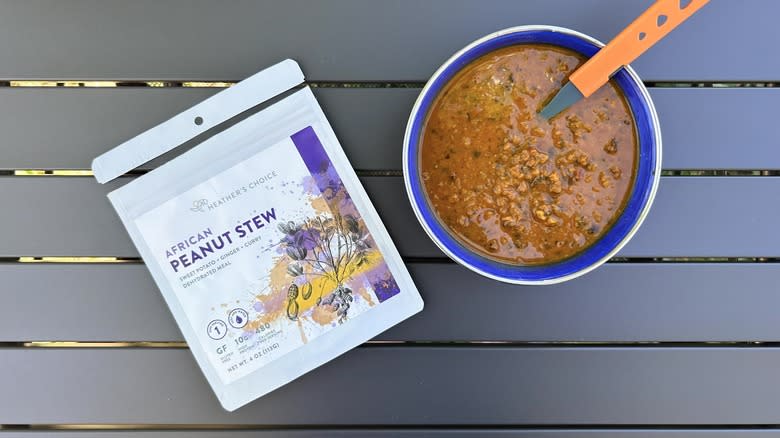
Heather's Choice was established in 2014 and currently operates out of Anchorage, Alaska. But per CNBC, founder Heather Kelly is planning to move the business to Oregon, where she can scale production and lower shipping costs while still maintaining quality — something she was unwilling to trade-off when appearing on "Shark Tank" in 2024.
I admire this brand's commitment to excellence, and truly, its meals are spectacular. The selection includes breakfasts like Morning Glory oatmeal made with organic gluten-free oats, as well as main entrées including vegan African peanut stew, grass-fed beef shepherd's pie, and wild-caught smoked sockeye salmon chowder. Impressively, these lunch and dinner options average 30.6 grams of protein per serving. For dessert, Heather's Choice creates coconut cookie Packaroons, available in lemon lavender, blueberry almond, and other flavors.
The meals' pouches are smaller compared to most competitors, which limits their eco-footprint and is ideal when backpacking. But portions are smaller and truly one serving — which makes the per-dinner price of $12.50 to $15.95 quite costly, even compared to another premium brand like Gastro Gnome. However, you get what you pay for! To avoid the shipping expense, consider buying Heather's Choice products in-store at REI and other retailers throughout Alaska and the Lower 48.
5. Gastro Gnome
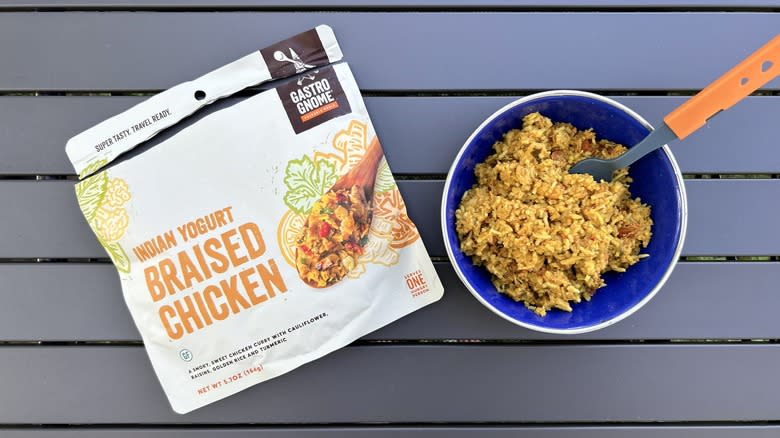
Gastro Gnome is based in Bozeman, Montana and was founded by professional chef Shannon Waters. Its dehydrated meals take a craft approach to backcountry cooking, with recipes inspired by its team's "favorite places on Earth," per its website. Savor options like Thai green chicken curry, Italian fennel sausage rigatoni, and spicy red chicken pozole. Delicious and comforting, these single-serve mains also pack in an incredible amount of protein, averaging 39.7 grams — which is more than any other backpacking meal brand tested.
The selection is limited to six main entrées, three breakfasts including bison chorizo hash, and two desserts: peach cobbler and its Montana huckleberry ice cream sandwich. Though the variety is comparatively less, Gastro Gnome caters to vegan and gluten-free diets.
Currently, pouches are not recyclable, nor compostable. But the company is a member of 2% for Conservation, which benefits wildlife and wilderness via funding and volunteerism. Gastro Gnome also supports other nonprofit organizations, including Leave No Trace. These efforts, along with incredible quality and flavor, may make it easier to justify the meals' price points. But admittedly, an average of $17 per dinner is steep — though, you could probably split them into two meals given the protein density and large portion size.
4. Backpacker's Pantry
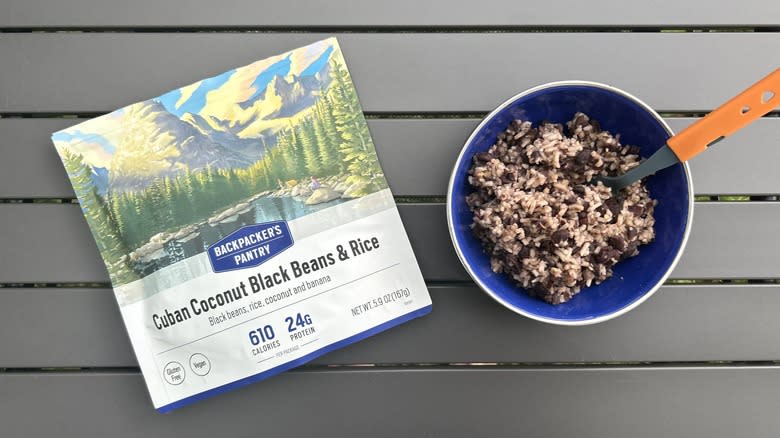
There's much to love about this industry pioneer. It was established in 1951 as Dri-Lite Foods and later rebranded as Backpacker's Pantry, which operates out of Boulder, Colorado. In addition to paving the way for similar brands, it sets a prime example in the areas of eco-consciousness and social responsibility. It's a member of 1% for the Planet and supports several non-profits that encourage environmental protection and diversity in outdoor recreation, among other efforts. Backpacker's Pantry also runs entirely on solar power and offsets its carbon emissions produced via shipping — but at this time, it does not use recyclable, nor compostable packaging.
More than 40 products make up the selection, which includes snacks for hiking, hot breakfasts, main entrées, and desserts for a variety of dietary needs. Favorites include its hearty lasagna, high-calorie pad Thai with chicken, vegan Cuban coconut rice and black beans, and the ultimate treat on the trail: freeze-dried crème brûlée. Depending on the recipe, packages hold one to two servings and can also be purchased in bulk kits.
When it comes to lunch and dinner meals, one serving contains an average of 15.4 grams of protein and costs between $5 and $7.99 — which is more affordable than most brands on this list. However, Backpacker's Pantry doesn't generally use organic ingredients, aside from its two oatmeal flavors.
3. Good To-Go
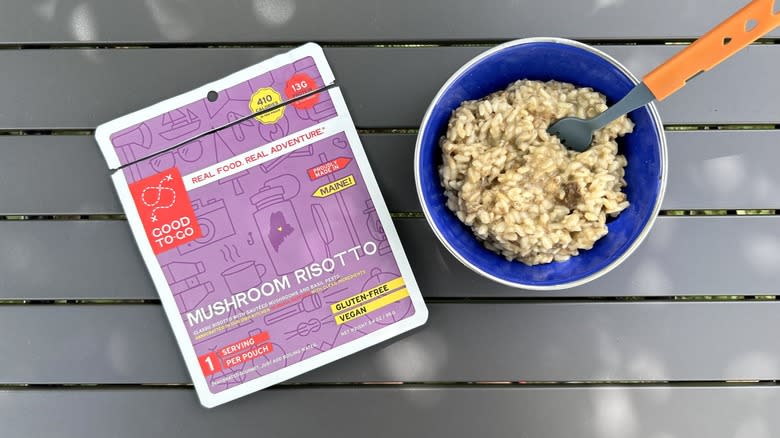
Good To-Go was founded in 2014 by Jennifer Scism, an "Iron Chef" winner and former co-owner of Annisa, a West Village restaurant that held a Michelin star for several years before shuttering. When Scism moved from NYC to Maine, she fell in love with the outdoors and combined her two passions in launching Good To-Go, which claims to be the first health-forward backpacking meal brand. All of its breakfasts and mains are low-sodium and gluten-free, and several accommodate plant-based diets.
One of the things I especially love about this brand is its Stove-Free meals, which include a carrot-ginger power bowl and a cucumber chaat salad. Requiring just cool water, they hit the spot on a summer day or when you simply can't be bothered to fire up the camp stove. Good To-Go also offers globally inspired hot entrées like its mushroom risotto, Cuban rice bowl, and spicy bibimbap.
All hot mains are available as single servings, priced at $8.60, as well as double servings which cost $15.50. Single and double-serving pouches can also be purchased as six-packs for $49.95 and $88.95, respectively. Considering competitors, these rates are mid-tier — and therefore, a great value given meals' quality and protein density, which averages 15.1 grams per serving. Unfortunately, Good To-Go Meals don't come in eco-friendly packaging, but the company limits its carbon footprint by recycling and committing to zero food waste in its operations.
2. Firepot
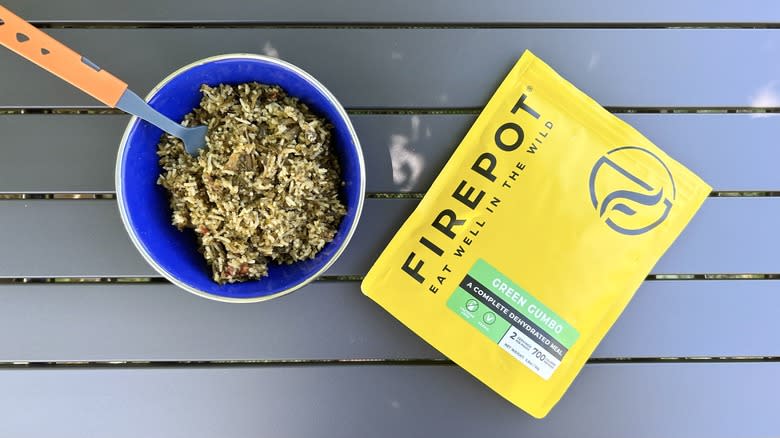
John Fisher founded Firepot in 2017 and operates his family-owned company in Dorset, a rural county in England. Local ingredients appear in the brand's delicious meals which include posh baked beans, a British breakfast staple, as well as entrées like New Orleans-inspired green gumbo, porcini mushroom risotto, and vegan orzo Bolognese. Mains pack in a solid 14.8 grams of protein per serving, and each pouch contains enough for two hungry backpackers.
Firepot takes pride in its eco-conscious ethics, offering a pouch recycling program to UK customers and committing to zero-waste operations. Crafting exclusively plant-based meals is also environmentally driven. According to the brand's website, which sources 2021 data collected by a third party, "Firepot's vegan options emit four times fewer carbon emissions than those containing meat." Several meals are also gluten-free, and all are made without the use of chemical preservatives.
Many things that are good for you and the planet often come at a premium. But Firepot's two-serving mains are priced between $14.50 and $15.30, which is a mid-tier rate considering competitors. It's honestly hard to find fault in this brand. My only critique applies to its packaging, which at this time cannot be recycled in the United States — but still, this is undoubtedly some of the best food to take camping and backpacking.
1. Farm To Summit
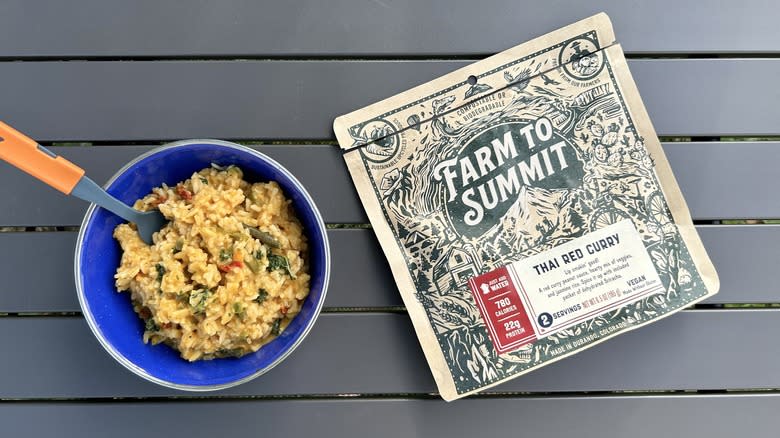
Jane and Louise Barden, partners in life and business, launched Farm to Summit in 2021. Its dehydrated meals are created in Durango, Colorado and feature several local farms' up-cycled produce. This sourcing practice is important to the brand, as growing up, Jane frequently saw loads of imperfect vegetables go to waste on her family's 100-acre farm. Not only is this all-too-common occurrence unsustainable, but studies demonstrate that ugly produce may have added nutritional benefit.
Its main entrées may not pack quite as much protein as other brands, but an average of 13.8 grams per serving is in line with the majority — and especially impressive given that all recipes are vegan or vegetarian. Several are also gluten-free, including its Puebloan beans & rice and Thai red curry — which pairs deliciously with its Thai carrot slaw, a pack I especially love. It requires just cold water and delivers that fresh veggie crunch I seldom can enjoy otherwise on the trail. Other comforting meals include its wild mushroom pot pie and green chile cheddar grits, which hits on the spot on chilly mornings.
Bonus: Farm to Summit's packaging is compostable and biodegradable. Plus, its two-serving main meals are reasonably priced between $12.50 and $15.50 — an average cost for an above-average product. I honestly love this brand and highly recommend giving it a try. Find its products online and in-store at hundreds of retailers across the country.
Methodology
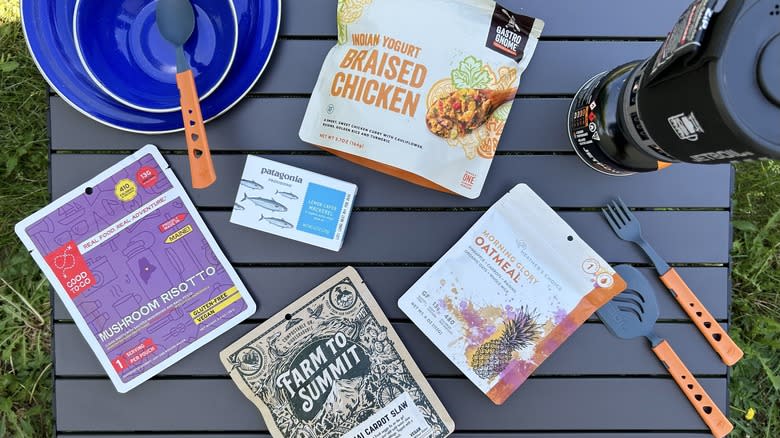
Food and the outdoors are my two favorite things, and so naturally, I was highly passionate about this review. Given the accessibility of REI, I chose to feature several popular backpacking meal brands carried by the retailer. I also researched smaller businesses and included those with generally positive reviews.
Then, I sampled at least one product from each brand. But taste is, of course, subjective, and one meal option cannot define a company as a whole. To create a well-rounded review, I considered overall variety. Points were awarded if a brand caters to common dietary restrictions, and offers breakfast, main, and dessert options. Extra recognition was given to those that take a craft approach! The quality of ingredients was also taken into account, and brands that use sustainably and ethically sourced products were ranked favorably. Average protein density per entrée serving was another factor, which I determined by compiling nutrition information from brands' websites onto a comprehensive spreadsheet. Price was another consideration, but more importantly, I aimed to determine value based on these criteria.
Finally, I looked into companies' environmental practices, which in my opinion are especially important for brands that promote outdoor recreation. I imagine that many consumers have similar values towards protecting the planet that we love to explore.
Read the original article on Tasting Table


